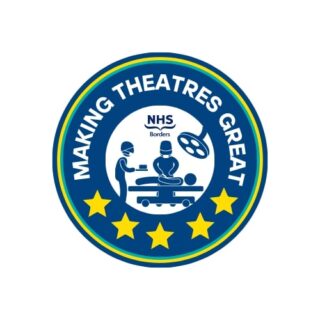Q Exchange
Making Theatres Great!
- Proposal
- 2023

Meet the team
Also:
- Imogen Hayward, Clinical Director for Anaesthesia and Critical Care
- Robin McLeish, Service Manager for Planned Care
- Sonia Borthwick, Quality Improvement Facilitator
- Matt Hislop, Quality Improvement Facilitator
- Bill Urquhart, Data Analyst
- Lisa Love, Senior Charge Nurse, Theatres
- Lynne McCutcheon, Clinical Nurse Manager
- David Riddell, Data Analyst
What is the challenge your project is going to address and how does it connect to the theme of 'How can improvement be used to reduce delays accessing health and care services'?
The COVID-19 pandemic has had a massive impact on the throughput of elective surgical cases in our Health Board. The planned surgical waiting list has grown significantly over the last 3 years and this has led to long waits for essential surgery, especially in key areas of orthopaedics and cataract surgery. This has a huge impact on the quality of life of our patients. We have identified causative factors:
· Poor efficiency
· Disengaged staff
· Lack of ring-fenced elective beds
· Surgical planning that does not align with demand
This project will involve using Appreciate Inquiry to re-engage surgeons, anaesthetists and nurses to work together to address team working, and systems thinking to address efficiency. We will improve surgical through put by optimising how waiting lists are prioritised and managed, and helping support patients to wait better.
What does your project aim to achieve?
The objectives of this project are to improve access for patients waiting for elective surgery and to re-engage theatre staff.
The aims of the project are:
- To improve team working and morale of all staff in theatre
- To increase theatre utilisation to >90% by October 2023
- To increase the number of elective theatre sessions (number TBC)
- To remove the backlog of long-waiting elective patients (>52wks) by September 2024
- To develop a system of allocating theatre sessions flexibly and based upon demand, allocating patients from waiting lists in a logical and systematic way that improves equality
- To use technology for list booking to maximise patient throughput for each elective session
How will the project be delivered?
We have formed a team comprising Service Manager, CD for Anaesthetics, QI Lead Clincian, 2 QI Facilitators and a data analyst. We have already engaged all surgeons, anaesthetists and theatre staff using an Appreciate Inquiry approach to understand issues surrounding team working and efficiency. We have held a whole-team educational session to explore solutions as a group.
We are building a list of change ideas which we will implement after prioritisation, and we will PDSA using a data dashboard that we have already instigated. We have visited an exemplar unit for advice and ideas, and their service manager has agreed to speak to our staff about their journey. The planning of lists is inefficient, labour intensive and person specific. We need a technological solution to help us analyse the list data we have so that intelligent booking enables more operations with our existing theatre time.
How is your project going to share learning?
This project on surgical session modelling is part of a wider project aimed to increase theatre productivity and re-engage staff. We have already implemented the IHI Joy in Work framework and performed hundreds of individual interviews with staff members and we are now starting to implement tests of change geared toward reducing delays between cases.
There is already significant learning here, both within our Health Board and beyond, as many other hospitals are facing the same problems as us. We are journalling our progress in anticipation of describing our journey within our Health Board and to other elective surgical units once we have shown success.
How you can contribute
- What ideas have worked for you to improve theatres efficiency?
- How do you schedule cases and plan theatre lists so that you i) make access to theatre equitable for all patients and ii) fill the lists without causing overruns?